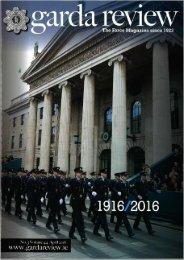Conference Report 2016
Table of contents contains links on page 5. It can be used to skip through chapters.
Table of contents contains links on page 5. It can be used to skip through chapters.
Create successful ePaper yourself
Turn your PDF publications into a flip-book with our unique Google optimized e-Paper software.
Section 1: Pay and Allowances<br />
1.20 In the face of significant societal, crime-type,<br />
legislative and organisational change, it is not<br />
surprising that the evidence should confirm that<br />
police work is highly stressful. Occupational<br />
psychologists concur that policing is ‘emotionally<br />
dangerous’ and a relatively ‘high-risk’ job.<br />
1.21 Extensive longitudinal research serves to confirm<br />
that the pressures of law enforcement place<br />
officers at real risk of high blood pressure, insomnia,<br />
dangerous levels of destructive stress hormones,<br />
heart problems, post traumatic stress disorder and<br />
suicide. The practical impact of the job’s demands<br />
and responsibilities on stress levels in An Garda<br />
Síochána was confirmed at University College Cork,<br />
which found that 32% of gardaí are experiencing<br />
‘above-average’ levels of stress, whilst one-fifth<br />
suffer from ‘severe’ levels of stress.<br />
1.22 Gardaí remain liable to disciplinary action in their<br />
personal indebtedness. Our members’ predicament<br />
is accentuated by the prohibition on their spare time<br />
activities to significantly hamper their scope to<br />
pursue additional income, sharply contrasting with<br />
the types of restrictions applied to other public<br />
servants and police forces across Europe;<br />
underlining the ‘unique’ status of the garda.<br />
1.23 A garda is restricted from the development of a<br />
business interest or restricted if a business is<br />
carried on by a spouse at any premises within their<br />
area of jurisdiction, or by any member of the family<br />
at the premises at which the officer resides. This is<br />
a significant constraint and another consequential<br />
feature of the garda’s ‘unique’ status. No other<br />
public servant is subject to such a constraint upon<br />
either the individual or the wider family to reduce<br />
personal debt. Gardaí cannot drive a taxi or minicab<br />
to supplement their income.<br />
1.24 Gardaí may be prohibited from serving at any station<br />
within 32 kilometres of any place where:<br />
(i) the member or the member’s spouse or partner<br />
has relatives permanently residing;<br />
(ii) the member’s spouse or partner, or other family<br />
members, or relatives, engage(s) in any<br />
business requiring a license or certificate or<br />
(iii) where the member’s spouse or partner or other<br />
family member is the proprietor of any business<br />
that is conducted from a shop.<br />
1.25 A garda is obliged by regulation to accept a transfer,<br />
whether temporary or permanent, to any location<br />
directed by the Garda Commissioner. Transfers can<br />
cause major disruption in the lives of a garda and their<br />
family, and can be hugely upsetting and stressful.<br />
Transfers have also been regularly deployed as a form<br />
of discipline or punishment and there is a well-founded<br />
and independently substantiated judgement that<br />
some transfers are unfair, unreasonable, uncaring,<br />
unnecessary or malicious. Few employments have<br />
such a major drawback.<br />
1.26 Four out of every five serving gardaí have no<br />
prospect of promotion and will retire at the rank of<br />
Garda. The scarcity of promotion opportunities in An<br />
Garda Síochána has to be acknowledged and<br />
addressed, as it has a major negative impact on<br />
morale and motivation. The scarcity of promotion<br />
opportunities provides a case for the reconstruction<br />
of the pay scale with increments for those gardaí<br />
that have satisfactorily completed 15, 20 and 25<br />
years of service.<br />
1.27 Few occupations include compulsory overtime.<br />
Serving to further underline the ‘unique’ status of<br />
the garda, there is an obligation on members to<br />
discharge their duties on the basis of ‘overtime’<br />
arrangements on the direction of either a superior<br />
officer or other external source, such as the<br />
judiciary. Unlike employment arrangements<br />
affecting the national workforce, members of An<br />
Garda Síochána are obliged to work unsocial hours.<br />
1.28 An Garda Síochána remains the most trusted role<br />
model or institution in the State. However, a host of<br />
authoritative sources have also been forced to<br />
acknowledge that there is an unprecedented morale<br />
crisis in the organisation and that it must be<br />
addressed as a matter of priority.<br />
1.29 The leadership of this Association has gone to great<br />
lengths to contain the disillusionment and some<br />
militant responses proposed by sections of the<br />
membership. It may not be possible to persist with<br />
this containment. The GRA survey of members in<br />
2010 revealed that 93% backed some form of<br />
industrial action. The morale slump attributed to<br />
poor leadership, declining rank numbers,<br />
depreciating equipment, reduced resources, rising<br />
levels of assault on on-duty (and off-duty) gardaí<br />
and the financial predicament faced by many gardaí.<br />
The Association urges the empowered parties to<br />
deliver on the promise that public trust and<br />
confidence will be restored, by focusing on the<br />
public face of An Garda Síochána (Garda rank) and<br />
proceeding to ensure the proper treatment of the<br />
rank’s remuneration and employment conditions.<br />
1.30 Having regard to the realities, the Association<br />
proposes that this Review increase garda pay in<br />
38th Annual Delegate <strong>Conference</strong><br />
15




